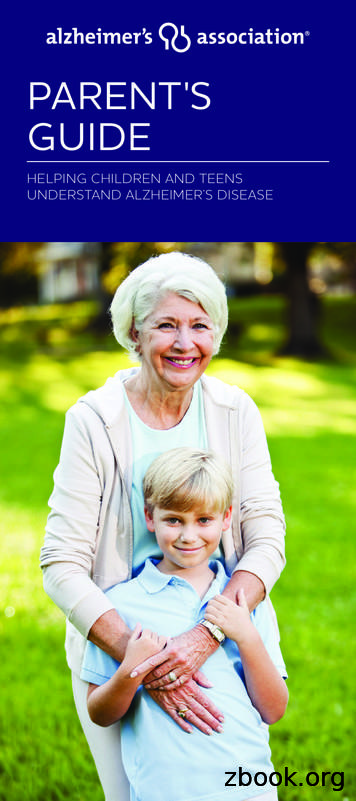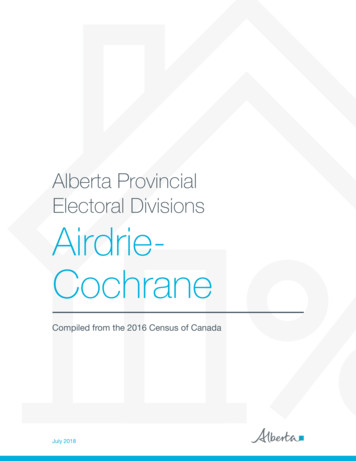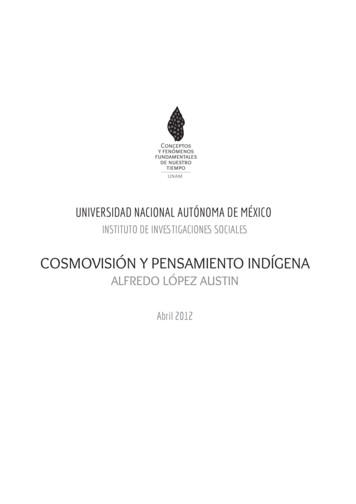Parent's Guide: Helping Children And Teens Understand .
PARENT'SGUIDEHELPING CHILDREN AND TEENSUNDERSTAND ALZHEIMER’S DISEASE
HOW ALZHEIMER’S DISEASEAFFECTS KIDS AND TEENSAlzheimer’s can have a big impact onevery member of the family, includingchildren. Each child will react differentlyto someone who has the disease.Young people might have questionsabout what's happening as the diseaseprogresses. It’s important to answerthese questions openly and honestly, andshare with them the changes the diseasemight bring.Factors that may affect your child include:» His or her relationship to the personwith dementia (a parent, grandparent,relative, friend).» How close your child is to the personemotionally.» Where the person lives (in the samehome, long-term care facility,another state).
CONTENTS1. Common reactions. p.22. Special issues for teens. p.43. Common questions. p.64. How parents can help. p.81
1.COMMONREACTIONSWhen a family member is living with dementia,your child or teen might feel:» Sad about how the person is changing.» Curious about how people developAlzheimer's.» Confused about why the person actsdifferently or doesn’t recognize him or her.» Frustrated by the new things it’s necessaryto do, like repeating words or phrases.» Guilty for resenting the time and resourcesthe person requires of the family.» Afraid of how the person may behave.» Jealous of the additional time and attentiongiven to the person.» Worried that he or she — or other friendsand family members — might also developAlzheimer’s.» Embarrassed to have visitors if the personis home.» Unsure how to behave around the person.All of these feelings are normal. However,Alzheimer's disease impacts people, includingchildren, in different ways. Some may respondwith many of these reactions while others mayhave few problems or questions.ENCOURAGE JOURNALINGWriting down thoughts and expressingfeelings in a journal can bring comfort toyour child or teen.2
It might be difficult to recognize how your childis feeling. A child who is having a hard timeunderstanding or accepting the disease might:» Withdraw from or lose patience with theperson with dementia.» Express physical pain, such as an upsetstomach or headache.» Do poorly in school.» Spend more time away from home.» Stop inviting friends home to visit.» Argue more, especially with those providingcare for the person with Alzheimer’s.3
2.SPECIAL ISSUESFOR TEENSAdolescence is challenging, and the disease maybring even more changes to your teen’s life.For example, you may need to ask your child topitch in more around the house or to assistwith caregiving.Teens may express a variety of thoughts,both good and bad, about how their lives havechanged, such as:» When I help out with my uncle, I feel like myfamily really needs me.» I feel good that I know how to do the littlethings that make a difference for my dad.» I’ve never felt closer to my mom than I do nowbecause we’re facing this together.» I don’t like to talk with my friends about what’sgoing on.» Sometimes I feel embarrassed about how mygrandpa is acting.» I don’t feel comfortable having friends over.» My parents don't have as much time for mebecause my grandma takes all their attention.» It's not fair to ask me to do so much. I'd ratherbe doing something fun.4
10 ACTIVITIES CHILDRENAND TEENS CAN DO WITH APERSON WITH DEMENTIA1.Bake cookies.2.Take a walk around the neighborhood.3.Put a puzzle together.4.Weed a garden or plant flowers.5.Color or draw pictures, or look at photos.6. Create a scrapbook or fill a memory boxwith mementos.7.Read a favorite book or story.8.Eat a picnic lunch outside.9.Watch reruns of old TV shows together.10. Listen to or sing favorite songs.5
3.COMMONQUESTIONSEncourage your child to ask questions. Answerhonestly and using age-appropriate explanations.The Alzheimer's Association can provide youwith information to help answer these questionsand suggestions for coping with changes thataccompany the disease.Possible answers to questions your childmay ask:Q: W hat is Alzheimer’s disease?A: A lzheimer’s is not just memory loss; it’s adisease that affects how the brain worksand how a person thinks. Over time, it alsochanges the way a person’s body functions.Q: W ill my mom get Alzheimer’s, too? Will I?A: M any scientists believe that there’s a greaterchance of getting the disease if someone inyour family has it, but not everyone who’srelated will get it. Most people who developAlzheimer’s are older.Q: W hy does my grandpa call me by mydad’s name?A: Changes inside your grandfather’s brain maymake it difficult for him to remember thingslike your name. This is not your fault or his.You may remind him of your dad at your age.It’s best not to correct him, as that could upsetor frustrate him.Q: W ill my grandma die from Alzheimer’s?A: We don’t know for sure. Some people withAlzheimer’s do die from the disease, whileothers may pass because of another serioushealth condition.6
Q: W hy does my aunt keep asking thesame question?A: People with Alzheimer’s often rememberevents that happened years ago, but forgetthings that happened yesterday or even a fewminutes ago. Your aunt may not rememberthat she already asked a question. It’simportant to be patient and respond, even ifyou’ve already done so.Q: H ow can I help my grandpa?A: S imply being there for your grandfather canshow you care. Even when he reaches thepoint where communication is difficult, loveand kindness can be felt in the moment.Q: W ill my uncle get better?A: Your uncle will have both good and bad days.Even though there are no treatments or acure yet, scientists are working really hard tofind them.Q: W ill I get Alzheimer’s if I spend time withmy aunt?A: A lzheimer’s is not contagious. You can’t catchit from other people like you can the flu orchickenpox. It’s a degenerative disease, whichmeans it develops in the brain over time.Q: W hat are some things we can do together?A: S imple activities like listening to music,setting the table, reading a book and lookingat photographs are great ways to spend timewith the person with Alzheimer’s.Q: W ill my grandma forget me?A: A s your grandmother’s brain changes, she mayforget many things, but she will still be able tofeel your love.7
4.HOW PARENTSCAN HELPKeep lines of communication openGood communication is the best way to help yourchild deal with the changes that are happening.Answer questions honestlyRespond simply to questions in an age-appropriateway. Try not to sugarcoat the message. Childrenare excellent observers and often aware if ananswer doesn’t sound right.Help your child learn more about Alzheimer'sBegin sharing information about the disease andits symptoms as soon as you can. Use words thatare easy to understand and encourage your childto ask questions.Reassure your child that just because a person inthe family has Alzheimer’s, it doesn't necessarilymean that he or she or other family memberswill get the disease, too. Great progress has beenmade in scientific research. Let your child knowthat better treatments and even a cure could bediscovered in his or her lifetime.Let your child know his or her feelings are normalYoung people need a way to share their feelingsabout having a family member with Alzheimer’s.Show comfort and support by letting them knowthat those feelings are normal.Create opportunities for your child toexpress feelingsMake sure your child is getting enough support.Set aside a regular time to be together. Activitiesor outings can create great opportunities for achild to open up. If your child expresses feelings ofhelplessness, work together to find a way to getinvolved in the care process. For ideas, contact theAssociation’s 24/7 Helpline at 800.272.3900.8
Prepare your child for changesAlzheimer’s worsens over time. A person withdementia may look healthy on the outside, buton the inside, the brain is not working properly.Let your child know what changes to expect. Talkabout what those changes will mean for him orher and your family. Also, make sure your childunderstands why you might have less time tospend together.Assure your child it's not his or her faultAlzheimer’s can cause a person to directconfusion, fear or anger at the child. If thishappens, be sure the child knows the persondid not mean to act that way. People withdementia have good and bad days, and caregiverssometimes seem tired, frustrated andshort-tempered. It's important for children toknow that they're not responsible for how othersare acting or feeling.Inform your child's teacher andschool counselorLet them know the ways that Alzheimer’s diseaseis affecting your child and the family. Teens mayopen up more to an adult outside of the family,so explore whether a teacher, counselor oranother kind of mentor is available.A RESOURCE FOR KIDS & TEENSThe Alzheimer’s Association website featuresa Kids & Teens page (alz.org/kids) where youand your child can access information andsupport, as well as videos of others like themwho are facing the disease in their families.9
alz.org/careThe Alzheimer’s and Dementia CaregiverCenter provides information and resources.alz.org/CRFCommunity Resource Finder - Find localresources.alzconnected.orgALZConnected – Connect with othercaregivers who can relate to your situation.alz.org/findusWe’re in communities nationwide.800.272.390024/7 Helpline – Available all day, every day.The Alzheimer’s Association is the leading voluntary healthorganization in Alzheimer’s care, support and research.Our mission is to eliminate Alzheimer’s disease throughthe advancement of research; to provide and enhancecare and support for all affected; and to reduce the riskof dementia through the promotion of brain health.Our vision is a world without Alzheimer’s disease .800.272.3900 alz.org This is an official publication of the Alzheimer’s Association but may be distributedby unaffiliated organizations and individuals. Such distribution does not constitutean endorsement of these parties or their activities by the Alzheimer’s Association. 2018 Alzheimer’s Association . All rights reserved.Rev.Jan18770-10-0023
Parent's Guide: Helping Children and Teens Understand Alzheimer’s Disease Author: Alzheimer's Association Subject: Tips for talking with kids and teens about Alzheimer's disease. Created Date: 3/13/2018 10:04:13 AM
Downtown East Village Calgary Number Per cent Number Per cent Lone-parent families 30 100% Lone-parent families 47,330 100% Female lone -parent 20 67% Female lone -parent 36,955 78% Male lone -parent 10 33% Male lone -parent 10,380 22% Marital status Downtown East Village Calgary
silhouette children clipart drawing of a nice person helping others png clipart not helping others clipart chair old lady cross the street human helping the earth fundraisers clipart two girls clipart circle heart talking partner team building cartoon face to face communication clipart police car don t look down on someone unless your helping .
Independent Personal Pronouns Personal Pronouns in Hebrew Person, Gender, Number Singular Person, Gender, Number Plural 3ms (he, it) א ִוה 3mp (they) Sֵה ,הַָּ֫ ֵה 3fs (she, it) א O ה 3fp (they) Uֵה , הַָּ֫ ֵה 2ms (you) הָּ תַא2mp (you all) Sֶּ תַא 2fs (you) ְ תַא 2fp (you
Couples with children 7,560 50.2% 1 child 2,555 17.0% 2 children 3,370 22.4% 3 or more children 1,640 10.9% Total lone-parent families 1,540 10.2% 1 child 870 5.8% 2 children 495 3.3% 3 or more children 170 1.1% Lone parent female headed 1,150 7.6% Lone parent male headed 385 2.6% Averag
SPACE CITY PARENT PEARLAND PARENT FORT BEND PARENT KATY PARENT. According to the American Academy of Child and Adolescent Psychiatry, if one parent is obese, there is a 50 percent chance that their children will also be obese. But when exercise becomes part of the family culture, everyone wins.
Gross to Net Income Conversion Table Using Standardized Tax Amounts Monthly Gross Income Net Income Recipient Parent with Number of Children for Whom Support Is Being Determined Parent with Duty to Support . 1 Child 2 Children 3 Children 4 Children 5 Children 6 Children Monthly Gross
access the Parent Portal. User Guide - Step-by-step instructions on how to create a Parent Portal account. Password Reset/Account Look-up - A link for parents to request their user ID and/or password through their registered e-mail account. The Parent Portal Access page lists the information required to create a new parent portal account.
Por Alfredo López Austin * I. Necesidad conceptual Soy historiador; mi objeto de estudio es el pensamiento de las sociedades de tradición mesoamericana, con énfasis en las antiguas, anteriores al dominio colonial europeo. Como historiador no encuentro que mi trabajo se diferencie del propio del antropólogo; más bien, ignoro si existe alguna conveniencia en establecer un límite entre .























